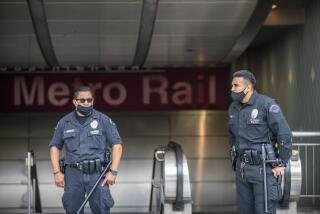Turn to Arbitration, Get the Buses Going Immediately
- Share via
The breakdown in negotiations to end the strike by the United Transit Union against the Metropolitan Transportation Authority requires a dramatic change in the way the dispute is being handled. Traditional negotiations and mediation have not worked. The cost to the community and damage to our economy are too great to let the current impasse continue.
The parties should submit their contract dispute to an arbitration board that would choose between each party’s final proposals. The arbitrators’ authority would be limited to selecting either the MTA’s or the union’s final proposal.
The drivers would return to work immediately. Any increase in pay or benefits under the new contract would be paid to them retroactively, while any reduction would not take effect until the arbitrators issued their decision. The advantage of this type of arbitration is that it would put the maximum pressure on each side to compromise in formulating their final proposals because being unreasonable would risk the arbitrators’ picking the other side’s final proposal.
The pressure to compromise produced by this kind of arbitration often results in an agreement by the parties themselves, making a decision by the arbitrators unnecessary. The threat of a total loss changes the internal politics for both sides, forcing hardliners to rethink their intransigence when confronted with the possibility of a victory for the other side.
To guard against both parties submitting unreasonable final proposals, the arbitrators would have the authority to remand the dispute for the parties to submit new final proposals. Continued intransigence would increase the risk of a defeat.
The criteria the arbitrators would use in picking between the parties’ final proposals should be spelled out before the final contract proposals were submitted to the arbitrators and should include: the provisions of other transit labor contracts; the financial condition of the MTA; and the impact of the new contract on riders and the public in general. If possible, the parties themselves would establish the standards to be used by the arbitrators in resolving the dispute, but if they could not reach agreement even on that preliminary matter, the arbitrators would use the final-offer selection process to determine what criteria to apply.
Who would the arbitrators be? One possibility would be for each side to pick one arbitrator and for those two to pick a third, neutral arbitrator. That way both sides would participate directly in the arbitration process. The disadvantage is that having only one neutral in a three-member arbitration board almost always results in a dissenting opinion from the losing side.
If the parties were able to reach an agreement, a better alternative would be to use a three-member panel made up of neutrals. Given the magnitude of the dispute, the members should be people of national stature and experience in labor-management disputes, such as former secretaries of Labor Robert Reich and Lynn Martin, former California Supreme Court Justice Joseph Grodin, or retired UCLA law professor Benjamin Aaron.
While not common, this kind of arbitration has been used to resolve other intractable labor disputes, most notably in professional baseball.
This dispute is critically important to everyone involved: the drivers who have to support their families, the riders who will have to pay the higher fares that could come from a new contract and the taxpayers who help pay the costs of operating the MTA. But the issues in dispute cannot possibly justify the cost to the community of a continued strike when a fair alternative is readily at hand.
More to Read
Sign up for Essential California
The most important California stories and recommendations in your inbox every morning.
You may occasionally receive promotional content from the Los Angeles Times.













